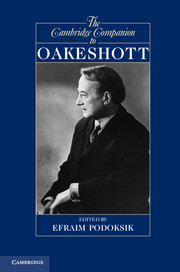Book contents
1 - Oakeshott as philosopher
from Part I - Oakeshott's philosophy
Published online by Cambridge University Press: 28 September 2012
Summary
All understanding are conditional
INTRODUCTION: PHILOSOPHY
Philosophy now means more or less anything done by philosophers. But the history of philosophy suggests that there are four points of the philosophical compass, which I would like to call wonder, faith, doubt and scepticism. That is to say, any philosopher is likely to have an attitude that involves one or more of these views:
that there is a world and no words to explain it, so that words and world are part of one undifferentiated reality – and our response is wonder,
that there is a world, and one word to explain it, which is not itself of this world, and so explains it on authority – and our response is faith,
that there is a world, and many words which appear to explain it, of which we, by some method or other, must examine to establish the certainty we suppose is there – and our response is doubt,
that there is a world, or worlds, and many words which appear to explain it, or them, none of which have any greater authority or reason or status than any other, so that we are left with uncertainty – and so our response is scepticism.
All of these views were there at the beginning and will be there at the end. The classical philosophers established philosophies with all these orientations. But for the last five centuries or so philosophers have tended to ignore wonder, dismiss faith and rebut scepticism. Philosophy, in modernity, is doubt and nothing but doubt.
- Type
- Chapter
- Information
- The Cambridge Companion to Oakeshott , pp. 7 - 41Publisher: Cambridge University PressPrint publication year: 2012
- 1
- Cited by



